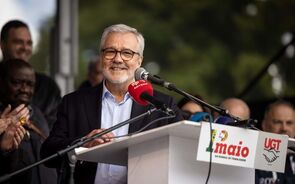G20
3 mensagens
|Página 1 de 1
Já a prever que vá ser uma reunião "morna", Sarkozi já agendou uma outra para 100 dias depois. Já está Obama como mr. President há cerca de um mês.
Mais uma vez acho que, Durão Barroso foi ultrapassado por Sarkozi.
Mais uma vez acho que, Durão Barroso foi ultrapassado por Sarkozi.
G-20: Shaping a new world order
U.S. economic mettle tested as emboldened leaders of the world's 20 largest countries gather in Washington.
NEW YORK (CNNMoney.com) -- The role of the United States as the world's economic leader will be tested this weekend when emboldened leaders of the 20 most powerful countries meet in Washington to address the global financial crisis.
Some European leaders are hailing the summit as the next Bretton Woods - a reference to the historic talks in the latter days of WWII that in effect made the dollar the world's dominant currency and laid the foundation for the economic order of the past 60 years.
The United States basically ran those meetings. Close to prevailing in the Great War, it was the world's undisputed military and economic leader.
But today, with the current credit crisis partly rooted in America, and with the rising economic might of China and a unified Europe, that dominance is being challenged.
"The Europeans see themselves as taking a position equal to the U.S.," said Irene Finel-Honigman, an international affairs professor at Columbia University specializing in international banking. "We're looking at a different composition of players and a different powerplay. It's going to be fascinating to watch."
Europe's heavy hand
To bolster their position, the Europeans come to the meeting emboldened by their belief that the credit crisis didn't originate on their soil.
They say that means the more tightly regulated European banking model has triumphed over the more lax laws favored in America.
"The initial response was accusing the U.S. of cowboy capitalism," said Finel-Honigman. "But as the weeks passed, it's become clear we're all in this together."
Together or not, deep divisions still exist between the United States and the Europeans, who initially called for this meeting and will be pushing an agenda heavy on new rules.
Their proposals include: Greater oversight of hedge funds and investment banks. Increasing how much money banks need to keep in reserve. More transparent and universal accounting standards. And limits on executive pay.
All that would be accompanied by a new global network of regulators - regulators that would presumably have power over U.S. banks, a potential non-starter with the Bush administration.
"Self-regulation to solve all problems, it's finished," French President Nicholas Sarkozy was quoted saying in the Guardian newspaper last month. "Laissez-faire, it's finished. The all-powerful market that is always right, it's finished."
Moreover, the Europeans are expected to come to the talks presenting a more united front than ever. And they are likely to use one voice to gain international support to counter U.S. policies which many blame for this crisis.
The United States
For the United States, the main goal of the summit will be to derail many of these new regulations, said Robert Brusca, chief economist at Fact and Opinion Economics, a Manhattan consultancy.
It's a goal Brusca seems to fully support.
"The last thing we need is another powerless, toothless, cumbersome global agency," he said. "You need to let [banks] run their business, the government isn't going to run it any better."
The Bush Administration is of the same mindset.
While Bush has agreed some more regulation is needed, particularly when it comes to unifying accounting standards and increasing transparency, he is wary of too much government involvement.
"We must recognize that government intervention is not a cure-all," Bush said in statement just before the summit Thursday, which seemed almost designed to temper European expectations. "History has shown that the greater threat to economic prosperity is not too little government involvement in the market - but too much."
Brusca said the United States should instead focus on what he views as more fundamental causes of this economic crisis - mainly China's unwillingness to let its currency, the yuan, rise in value.
The low yuan, Brusca argues, make Chinese goods unfairly competitive, and prods U.S. consumers buy too much. This gives China its huge trade surplus, which it has used to buy U.S. Treasuries, mortgage-backed securities and other products that allowed all these banks to lend so freely in the first place.
"They have abused the rules of the game, and politically, this is very dangerous," he said.
The Bush Administration may raise this issue at the talks. Getting China to raise the yuan was, after all, one of the administration's highest priorities just a few years ago.
China, Russia, and everyone else.
When a consensus is achieved by the G-20 it carries a lot of weight. With its 19 nations plus the European Union, it represents 90% of the world's economy and 75% of its population. But reaching a consensus is the toughest part for such a big and powerful group.
And at this summit, China, Russia, and most developing countries will be pushing for more power, not just within the G-20, but in other, more exclusive clubs like the G-7, the World Trade Organization, and the International Monetary Fund.
With all these nations pushing for such disparate things, it's unlikely much will get done, at least this time around.
The Europeans are unlikely to push China to reform its currency because of what China will likely ask in return, said Sebastian Mallaby, a senior fellow for international economics at the Council on Foreign Relations.
"China isn't going to give up its export-led growth strategy for the sake of the international system unless it gets a bigger stake in that system - meaning a much bigger voice within the International Monetary Fund and a corresponding reduction in Europe's exaggerated influence," Mallaby wrote in a recent op-ed in the Wall Street Journal. "Naturally, the Europeans aren't proposing it."
And despite America coming to the table with a black eye from selling these rotten mortgage backed securities around the globe, nearly everyone says the country, with its massive economy and long history of solid stewardship, is still in the driver's seat when it comes to setting worldwide economic policy.
"There is no other country that could offer the leadership that would cause the G-20 to come up with anything even worth thinking about," said George Magnus, a senior economic advisor at the Swiss bank UBS.
That means the Europeans are unlikely to get the type of oversight they're proposing.
Combine the wide range of interests, the complexity of the problem, and the fact that the U.S. is being represented by a lame duck president - Barack Obama is not expected to attend - and it's unlikely anything will get accomplished besides, maybe, a commitment to meet again.
"I have quite low expectations of what's likely to be achieved," said Magnus. "This is just the beginning of a long and crucial dialogue."
Um abraço e bons negócios.
Artur Cintra
Artur Cintra
- Mensagens: 3157
- Registado: 17/7/2006 16:09
- Localização: Cascais
Sem Obama vai ser dificil decidir o que quer que seja... provavelmente o resultado da reunião vai ser a agenda de uma próxima reunião em 2009 
Be Galt. Wear the message!
The market does not beat them. They beat themselves, because though they have brains they cannot sit tight. - Jesse Livermore
The market does not beat them. They beat themselves, because though they have brains they cannot sit tight. - Jesse Livermore
G20
Não vai sair dali grande coisa. E talvez isso seja o melhor.
Bush comes out fighting for free markets
By FT Reporters
Published: November 13 2008 19:20 | Last updated: November 13 2008 19:20
George W. Bush on Thursday delivered an impassioned defence of the free market ahead of the G20 summit in Washington, serving warning that his administration would resist efforts to impose heavy-handed regulation on financial markets.
The outgoing US president vowed to support efforts to bring stability and transparency to the financial system but warned it would be a “terrible mistake” to allow “a few months of crisis” to undermine faith in free market capitalism.
“While reforms in the financial sector are essential, the long-term solution to today’s problems is sustained economic growth,” he told an audience in New York. “And the surest path to that growth is free markets and free people.”
His remarks reflected US determination to push back against some of the more aggressive European proposals for tougher international financial regulation at this weekend’s emergency meeting of the 20 leading economic powers.
Lowering expectations for the summit, Mr Bush said the challenges facing the global economy were too great to be resolved in a single weekend and added the talks would be the first in a series of meetings.
As world leaders started arriving in Washington on Thursday, many seemed resigned to waiting until Barack Obama, the US president-elect, takes office in January for long-term solutions to be agreed.
Gordon Brown, the British prime minister, has championed reforms to global financial architecture, including a beefing-up of the International Monetary Fund, but even he admits this weekend’s talks will see only “initial” steps in that direction.
But leaders of Britain, France, Germany, Italy and Spain do want the summit to map out proposals that could bear fruit at another summit within the next 100 days.
European leaders are also expected to advocate a concerted global fiscal stimulus to shore up the slumping world economy.
Nicolas Sarkozy, French president, believes this is the moment for Europe to assert its expertise in multilateral solutions and to propose specific ideas for global solutions, with the European Union taking the lead.
Mr Sarkozy, holder of the EU’s rotating presidency, knows his hopes of global regulatory convergence will run into opposition from the US and China.
Britain is also resistant to too much heavy-handed regulation, still hopeful that some vestiges of its partly-discredited light-touch regulatory system can survive the financial turmoil.
For example the UK is wary of the ideas of Giulio Tremonti, Italy’s finance minister, who has advocated tighter global regulaton of both hedge funds and sovereign wealth funds.
In his speech on Thursday, Mr Bush acknowledged the need for tighter regulation in some areas of the financial system and backed calls for greater co-ordination between national regulators and reform of the World Bank and IMF.
However, the US president warned against viewing government intervention as a “cure all”.
In a swipe against critics of the light-touch US regulatory system, Mr Bush argued that many European countries had suffered problems in their own mortgage markets in spite of tougher regulations.
He said: “History has shown that the greater threat to economic prosperity is not too little government involvement in the market – but too much.”
As pessoas são tão ingénuas e tão agarradas aos seus interesses imediatos que um vigarista hábil consegue sempre que um grande número delas se deixe enganar.
Niccolò Machiavelli
http://www.facebook.com/atomez
Niccolò Machiavelli
http://www.facebook.com/atomez
3 mensagens
|Página 1 de 1
Quem está ligado:
Utilizadores a ver este Fórum: afcapitao, Albertomr , Bing [Bot], carlosdsousa, darkreflection, Ferreiratrade, Goya777, hugob0ss, Kury Yozo, latbal, m-m, malakas, maturidade, MR32, Nuno V, O Magriço, OCTAMA, Olhar Leonino, PAULOJOAO, Phil2014, PMP69, SerCyc, Simplório, trend=friend, trilhos2006, ze couves e 137 visitantes


